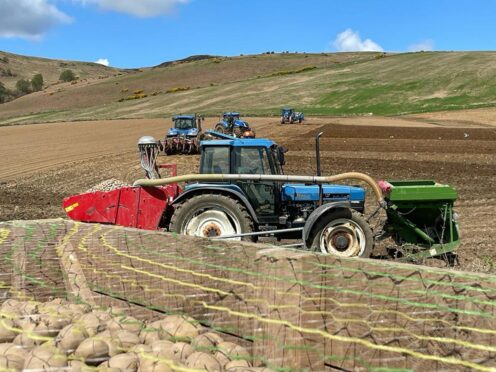Tommy Chalmers farms in partnership with his father Ian and brother Iain at Mill of Tulliebelton, Bankfoot, Perth, under the business John AH Chalmers.
The land amounts to 1,000 acres, with a further 150 acres under a contract farming agreement and an additional 450 acres in the local area.
All operations are covered in house with a fleet of trusted New Holland machinery and assistance from agronomists such as Agrii and RW Warnock, Agricultural Suppliers.
Assistance with contracting services is brought in at various times of the year.
Tommy, a seventh generation farmer, has always seen cereals grown on the farm with land let for potatoes.
A major change made by Tommy in 2020 was to grow potatoes in hand.
He said: “All decisions on the farm are made democratically however, potatoes are always something I have wanted to try, so I thought it would be as good an opportunity as ever to do so.
“This decision was made in conjunction with the move to blanket spring cereals as it was becoming ever more difficult to get winter crops in the ground immediately after potatoes due to the soil structure and wetter winters.
“Despite the pandemic, the potato enterprise was able to break even and has since earned its keep as one of the regular farm enterprises.”
All 150 acres of main crop potatoes currently in the ground are destined for chips and wedges for McCain’s and are marketed through Maincrop Potatoes.
The main business enterprise consists of 750 acres of spring barley which is destined for seed and malting purposes.
High nitrogen varieties such as Fairing and Soccer have been chosen in recent years as they tend to suit the farming business better after struggling in the past to get low nitrogen barley to grow for malting on the medium loam ground.
The barley grain is marketed by RW Warnock/Grain Co and is also destined to go directly to Crisp Malt, Alloa.
Approximately 135 acres of spring oats of the Conway variety is grown for seed and marketed to Alexander Harley Seeds Ltd, Milnathort, before being ultimately grown by producers for the Quaker UK supply chain.
This variety lends itself well to producing consistent yields, with good disease resistance, specific weight and high kernel content – everything a cereal producer wants to aspire to.
Interestingly, Tommy’s father Ian is one of the oldest serving suppliers in the area of seed barley to Alexander Harley as he has been doing so since 1976.
Despite market volatility and changes in agricultural policy, Tommy and his family have tried to average out input and output costs across the seasons.
“Luckily, we had some fertiliser in stock when the prices started to increase over recent years and our average cost has not been too high although the same cannot be said for the ever-increasing chemical costs,” he said.
“Our number one return historically has always been spring oats but we are finding the modern varieties are not yielding as good as they once did and by comparison the spring barley has been producing better returns.”
Yields for the family in 2022 saw spring barley at 3 tonnes per acre, with a five year average of 2.8 tonnes per acre, and oats at 3.5 tonnes per acre, with an average of 3.2 tonners per acre.
Potatoes most recently yielded 25 tonnes per acre of sellable crop, with a three year average of around 23 tonnes per acre.
“Things are looking well for 2023 despite some second growth and the ever-challenging Scottish weather,” said Tommy.
“We managed to start getting crops in on the 9th of April but we weren’t done sowing until May. Fortunately, the dry weather didn’t seem to affect the potato crop too much in terms of tuber initiation and the rain came in time for scab control therefore we haven’t had to irrigate.”
In terms of rotation, spring barley, cereals, potatoes and swedes are all integral to the regimen at Mill of Tulliebelton.
Whilst regular partaking of soil sampling, lime spreading and fertiliser are all key components, Tommy favours the more traditional soil sampling method via the use of barium sulphate to gain a more realistic reading and to ensure accuracy.
“We are firm believers in looking after the soil in terms of annual soil testing and the use of organic fertilisers,” he said.
“We do a straw for dung swap which also adds a great element to soil nutrition and it also uses a good proportion of our barley straw output. In addition to this, we have invested more and more over the years in wider and taller tyres for greater flotation and soil conservation which we feel ultimately returns benefits in yield and soil condition.”
Swedes are grazed by sheep to give a highly valued fertility boost for the fields as well as leaving a good soils structure.
